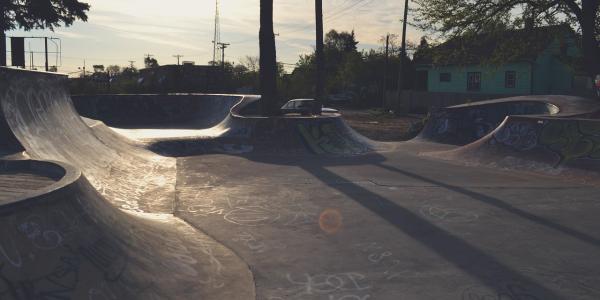Department of Music Lecture: Bryce Noe & Fang Liu, PhD students in Musicology, Washington University in St. Louis
Bryce Noe, PhD student in Musicology, Washington University in St. Louis
Title
"Sound(e)scaping Skateparks: Headphone Listening as Self-Imposed Isolation within Skateboard Culture”
Abstract
Skateparks are facilities where skateboarders often silence their immediate soundscape using portable music-listening devices. Listening to music through headphones can impose a rhythm onto practitioners’ skating as well as offer a private, euphoric experience of their surroundings (Pereira and Azevedo 2019). I conceive skateparks, then, as constituting a “sound(e)scape,” a space where practitioners employ MP3 devices to escape an otherwise cacophonous environment. Drawing on fieldwork conducted at skateparks, I argue that sound(e)scaping facilitates a sense of individualism fundamental to skatepark culture. My paper reveals how portable music-listening devices individuate skaters’ experience in two crucial ways. First, riders select music and craft playlists to alter their skating style and trick selections, opting for faster and louder music selections when attempting riskier and more physically demanding tricks. Second, the sight of headphones and their wires signals to other skatepark users a desire for solitude. Sounds emanating from speakers are often perceived as “mood killers” disruptive to skaters’ performances and, thus, telling riders to silence their Bluetooth devices is common. This sonic policing and self-imposed isolation facilitate concentration when performing tricks and an entitlement to control public space.
Sound(e)scaping, however, is more prevalent at public skateparks. Private skateparks, on the other hand, are equipped with sound systems playing music throughout the day. This shared music listening reflects a focus on community building, for private skateparks are controlled businesses requiring membership and annual fees and hosting afterschool programs to provide youth a safe space to spend time and practice with others. Still, skaters’ shared sense of entitlement over their external soundscape persists at private skateparks, as some riders noted their embarrassment skating to unsolicited popular music. While previous musicological and sound studies literature explores how portable MP3 technologies enable users to individualize their surroundings and silence others (Hosokawa 1984; Bull 2005, 2012; Sterne 2013), most studies cast these devices as autonomous and separate from humans. By introducing the verb “sound(e)scaping” to sound studies, this paper reframes headphones listening as a conscious and embodied human act to tame disorderly surroundings and facilitate physical performance (i.e., skateboarding).
Biography
Bryce studies choreography and sound in sport settings. In particular, he examines sporting spaces and events as sites whereby knowledge—both semantic and somatic—is transmitted sonically. Additional research interests include disability studies, popular music, and urban musicology. Prior to graduate study at Washington University in St. Louis, Bryce earned his Master of Music degree in Musicology at the University of Miami’s Frost School of Music. His master’s thesis, “Freestyle Soundscapes: An Acoustemology of Freestyle Skateboarding Contests,” is an exploration of freestyle skateboarders’ engagement with music and sound during contests as well as the (sub)cultural and gender politics embedded within such sporting spaces.
Fang Liu, PhD student in Musicology, Washington University in St. Louis
Title
"A Taoist Approach to Bach: Zhu Xiao-Mei's Performance of the Goldberg Variations"
Abstract
In her liner notes to her recording of Bach’s Goldberg Variations, Chinese-French pianist Zhu Xiao-Mei (born 1949) highlights the work's “cyclical character,” invoking the Taoist philosopher Laozi's saying, “The return is the movement of Tao.” She connects the piece to Chinese Taoist philosophy, underscoring the work's capacity to transcend cultural boundaries. This unusual interpretation is grounded in Zhu's extensive performances of the piece, which culminated in a 2014 recital at the Thomaskirche, establishing her as the first pianist to play at the site of Bach's burial.
Taking Zhu’s interpretation of the Goldberg Variations as a case study, this paper examines how her Taoist approach shapes her musical choices. The Tao Te Ching, the foundational text of Taoism written by Laozi in the 4th century BC, describes water as a natural force that, exemplifying the principle of wu-wei, flows with effortless efficiency and embodies virtues of calmness and spontaneity. Zhu acknowledges that her approach to the Goldberg Variations aligns with the water-like attributes of Taoist wu-wei, but how she embodies this philosophy in her performance remains unexplored. Drawing on Zhu’s memoir and the Thomaskirche recording, this paper argues that Zhu shapes her performance of the Goldberg Variations to convey specifically Taoist images and ideals, notably the metaphor of water’s flow, serenity, and spontaneity, and the concept of return as a transformational process. Although the sounds Zhu produces fit within the conventions of classical pianism, her words about her own aesthetic choices invite us to hear them as a Taoist’s engagement with Bach.

